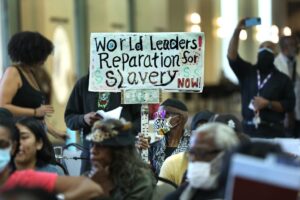The word reparations has been bandied about for some time, but the idea is beginning to take shape in California, and voters don’t appear too happy about it. A new poll shows the Golden State electorate is against offering money to descendants of slaves by a 2-to-1 margin.
The Los Angeles Times and the UC Berkeley Institute of Governmental Studies asked more than 6,000 registered voters in California whether they “support the idea” of cash reparations. Fourty-four percent were strongly opposed to the concept, with another 15% somewhat opposed, for a whopping total of 59% who say they are solidly anti-reparations.
Those surveyed also revealed differences based on race. White Californians – at 51% — were strongly opposed, Latinos were next at 43%, and Asian-Pacifics were against it by 39%. However, 51% of blacks strongly support it, and 25% say they are somewhat favorable to the idea.
Reparations — It’s Not All About Money
A University of Massachusetts, Amherst political science professor conducted a study that suggested the primary reason Americans oppose reparations isn’t the money. NPR reported that Tatishe Nteta found a “plurality of Americans don’t believe the descendants of slaves deserve reparations.” Others oppose the idea because it’s “impossible to place a monetary value on the impact of slavery.”
California is serious about the issue because Gov. Gavin Newsom (D) created a Reparations Task Force in 2020. A final report with recommendations was given to the governor and the state legislature. Now, it’s up to them to decide what to do.
One of the task force suggestions was to provide “cash payments to all descendants based on health disparities, mass incarceration, and over-policing and housing discrimination that have adversely affected Black residents compared with white Californians,” according to the Los Angeles Times.
But that was just the leading edge of the proposals. The Times elaborated:
“The remedies recommended in the report also go far beyond cash payments and include policies to end the death penalty, pay fair market value for jail and prison labor, restore voting rights to all formerly and currently incarcerated people, and apply rent caps to historically redlined ZIP Codes that disadvantaged Black residents, among dozens of other suggestions.”

Carolyn Cole / Los Angeles Times via Getty Images)
The poll also calculated along party lines how voters feel about reparations. Democrats were split: 43% favored it, and 41% were opposed. Republicans, on the other hand, came in with 90% against and 5% approving. Meanwhile, 65% of independents said reparations should not be made, while 22% were for it.
How California plans to deal with the task force recommendations is anyone’s guess, but the bottom line is still, well, the bottom line, and the question remains: Where will the money come from to make these payments? Liberty Nation’s Economics Editor Andrew Moran tackled this subject and postulated, “Since the government does not generate wealth, the state must confiscate wealth from people who had zero to do with the slave trade. Because corporations now cave to the demands of the left, maybe it is time that some of the largest businesses in the world fund these feel-good endeavors.”
Big business has already demonstrated its interest in socio-cultural matters by giving vast wads of cash to entities like Black Lives Matter. So, the idea that large corporations should pony up for reparations isn’t novel. The Times poll revealed that 60% of those surveyed said, “It’s unfair to ask today’s taxpayers to pay for wrongs committed in the past.” And it’s unlikely this sentiment will change in these challenging economic times. How California handles this sticky business will be closely watched by other states as it appears this issue is not going away and may even be gaining steam.

